Human rights commission rejects Colombian president’s attempt to save Peru’s Pedro Castillo
Gustavo Petro – an ally of the former president, who is currently under arrest after trying to shut down Peru’s Congress – asked the Inter-American Commission on Human Rights to intervene, but was told that the body respects the ‘democratic response’ of Peruvian institutions

Pedro Castillo – the former Peruvian president, currently under arrest after attempting to shutter his country’s Congress on December 7 – has received words of support from fellow left-winger, Gustavo Petro.
The Colombian president took to social media to implore that the Inter-American Commission on Human Rights (IACHR) – an autonomous organ of the Organization of American States (OAS) – issue precautionary measures in favor of Castillo. However, the IACHR strongly rebuked Castillo’s attempt to dissolve Congress to stay in power before a scheduled impeachment vote, recognizing the “democratic response” of Peruvian institutions. At no time did the IACHR or the OAS express concern regarding the Peruvian judiciary’s respect for Castillo’s human rights.
Petro is well acquainted with the workings of the Inter-American justice system, which attempts to promote respect for human rights in the Western Hemisphere. He appeared before the court in 2013, when Colombia’s attorney general dismissed him as the mayor of Bogotá for failing to implement a new sewage system. Seven years later, the IACHR concurred with Petro, declaring that the Colombian state had violated his political rights by removing an official who was elected by popular vote.
Today, as president of Colombia, Petro – a former guerilla and career politician – has attempted to present similarities between his case and that of Peru’s Castillo.
“Because he was a teacher from the [Andes]... he was cornered from day one,” Petro declared via Twitter. According to the Colombian leader, the Peruvian legislative branch had violated Peruvian democracy and the independent court system – bizarre allegations, considering that Castillo had announced his intent to close the Congress and “reorganize” the judiciary. Petro compared the nearly unanimous impeachment of Castillo by the Congress to the “parliamentary coups” that removed the former presidents of Honduras and Paraguay from power in 2009 and 2012 respectively. However, Petro also admitted that Castillo was “wrong” to attempt to dissolve the Congress.
There are stark differences between Petro’s 2013 challenge and the case of Castillo in 2022. Constitutional law expert Catalina Botero told EL PAÍS in a phone interview that the Attorney General’s Office of Colombia is an independent administrative body, while the Peruvian Congress is a political entity empowered to carry out an impeachment trial. Botero explains that “loss of trust” is a condition that is recognized within the Peruvian constitution, and that Castillo clearly violated the constitutional order with his announcement on Wednesday morning.
“Even if the conditions for dissolving Congress had been met, no power to reorganize the judiciary is recognized anywhere [in the constitution],” she notes, referring to another measure that the then-president announced.
Castillo’s speech was considered to be a coup d’état by all Peruvian institutions, including the Ombudsman’s Office, the Prosecutor’s Office, the Constitutional Court, the Armed Forces and the National Police. International entities – such as the IACHR – condemned Castillo’s proposed measures to avoid impeachment as being “contrary to the constitutional order.”
“The Commission recognizes the immediate action of the institutions of Peru in defense of democracy,” read their statement.
In any case, the Inter-American justice system does not employ preventative measures. Walter Arévalo – a professor at the Faculty of Jurisprudence at the University of Rosario – told EL PAÍS that in no way had the rights of the former Peruvian president been violated.
“In future criminal proceedings, Castillo is entitled to a series of guarantees. A precautionary measure can be requested at that time… but only if those guarantees are violated,” he cautions.
Petro has repeatedly said that the Inter-American Convention on Human Rights is a great solution for Latin America. Botero agrees with this, although she warns: “There must be the political will to remain faithful to those principles, beyond ideologies.”
Arévalo adds that, while the Inter-American Court of Human Rights – a different body – certainly requires increased financing, it is an efficient legal body that does not require significant reforms.
“Peruvian institutions know that they are being observed and that the [Inter-American Court] has jurisdiction over Peru. They will be careful to comply,” says the professor, who is also president of the Colombian Academy of International Law.
Contrary to the political opinions of Petro, the physical integrity and rights of Castillo – who has requested political asylum in Mexico – do not appear to be in any danger.
Tu suscripción se está usando en otro dispositivo
¿Quieres añadir otro usuario a tu suscripción?
Si continúas leyendo en este dispositivo, no se podrá leer en el otro.
FlechaTu suscripción se está usando en otro dispositivo y solo puedes acceder a EL PAÍS desde un dispositivo a la vez.
Si quieres compartir tu cuenta, cambia tu suscripción a la modalidad Premium, así podrás añadir otro usuario. Cada uno accederá con su propia cuenta de email, lo que os permitirá personalizar vuestra experiencia en EL PAÍS.
¿Tienes una suscripción de empresa? Accede aquí para contratar más cuentas.
En el caso de no saber quién está usando tu cuenta, te recomendamos cambiar tu contraseña aquí.
Si decides continuar compartiendo tu cuenta, este mensaje se mostrará en tu dispositivo y en el de la otra persona que está usando tu cuenta de forma indefinida, afectando a tu experiencia de lectura. Puedes consultar aquí los términos y condiciones de la suscripción digital.









































